Next Level Research Awards
2023 Funded Projects
Merging Engineering, Biology, and Animation to Transform Morphing Aircraft Design
PIs: Christina Harvey, Mechanical and Aerospace Engineering; Jonathon Schofield, Mechanical and Aerospace Engineering; Michael Neff, Computer Science
Combining disciplines ranging from biology to animation to robotics, this team’s visionary project is focused on understanding the biomechanics within the avian wing. Working with the California Raptor Center at UC Davis and an animator in the industry, the team hopes to combine these distinct ways of evaluating bird wing morphing to create a model that captures the true complexity of the avian wing. This model will be used to inform future uncrewed aerial aircraft, or UAV, morphing wing designs.
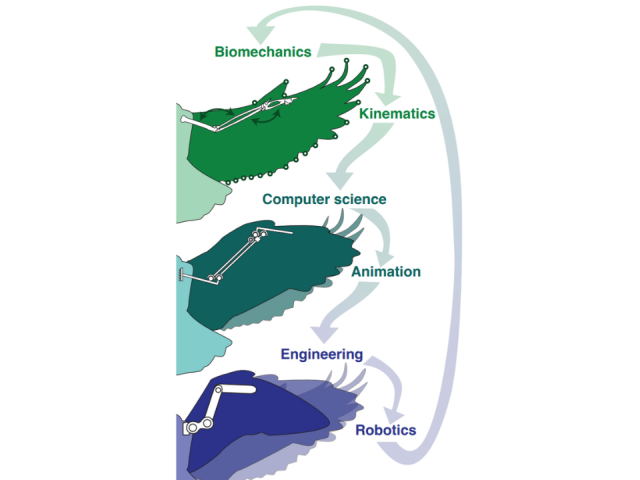
Breaking the 50% Efficiency Barrier with a Thermophotovoltaic Device
PIs: Jeremy Munday, Electrical and Computer Engineering; Marina Leite, Materials Science and Engineering; Scott McCormack, Materials Science and Engineering
Commercial power efficiencies in solar panels are currently about 20 percent, but UC Davis researchers believe they can break the 50 percent efficiency barrier with funding from their Next Level Research award. Their solution is a thermophotovoltaic cell that exceeds the current state of the art, while producing on-demand power. Traditional solar cells lose efficiency because they have to convert all of the different ‘colors’ of light from the sun. If the sun were more like a laser, with only a single color of light, solar cells could be much more efficient. The team believes that a practical device using a heat source, engineered photonic emitter, and photovoltaic cell has the potential for >50 percent power conversion efficiency. Using available resources, they aim to construct a proof-of-principle high temperature thermophotovoltaic device, which will enable additional funding and commercialization opportunities for the technology.
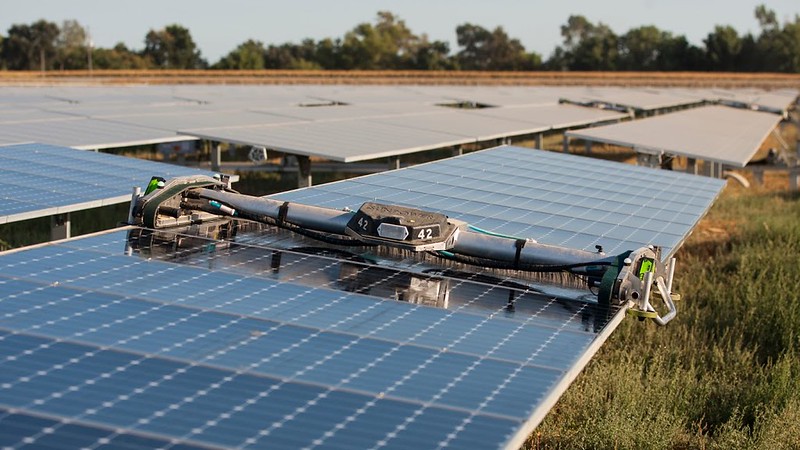
Solar farm at the University of California, Davis. Robotic washer moves along panel.
Engineering Bionic Prostheses for All: Accessible Artificial Limbs and Improved Quality of Life
PIs: Jonathon Schofield, Mechanical and Aerospace Engineering, Biomedical Engineering Graduate Group; Wilsaan Joiner, Biomedical Engineering Graduate Group
The loss of an upper limb has far-reaching implications, affecting daily activities, work, and social interactions for those affected. Emerging bionic prostheses offer tremendous potential to enhance users’ functional capabilities by recording signals from the brain or nerves to control dexterous robotic limbs. However, these systems are largely inaccessible, usually requiring implanted hardware and experimental surgeries conducted at a limited number of medical centers. Our long-term goal is to transform the accessibility of bionic upper limb prostheses by integrating approachable machine learning techniques with the contemporary standard of surgical care provided to individuals undergoing amputation at UC Davis Health. This Next Level Research Award will support the close collaboration between engineers and clinicians at UC Davis, aiming to catalyze the translation of accessible bionic prostheses. Building on this award, we intend to position UC Davis as a global leader in amputee care and innovation.

High-Performance, Zero-Emission, and Ultra-Quiet Aircraft Design and Operation with Over-the-Wing Distributed Propellers
PIs: Seongkyu Lee, Mechanical and Aerospace Engineering; Camli Badrya, Mechanical and Aerospace Engineering; Christina Harvey, Mechanical and Aerospace Engineering; Holly Oldroyd, Civil and Environmental Engineering
Advanced air mobility, or AAM, could grow into a $115 billion industry and this team’s project aims to take advantage of this growing industry by designing a high-performance, zero-emission, ultra-quiet aircraft in realistic turbulent environments using a novel concept of over-the-wing distributed electric propellers. UC Davis has critical expertise in AAM and the team will leverage its ongoing research activities and collaborations with NASA, Vertical Lift Research Center of Excellence (VLRCOE), and industry partnerships. Ultimately, this project will foster new collaborations with external universities and leading industries and pave the way for a large grant application.
View all investigators
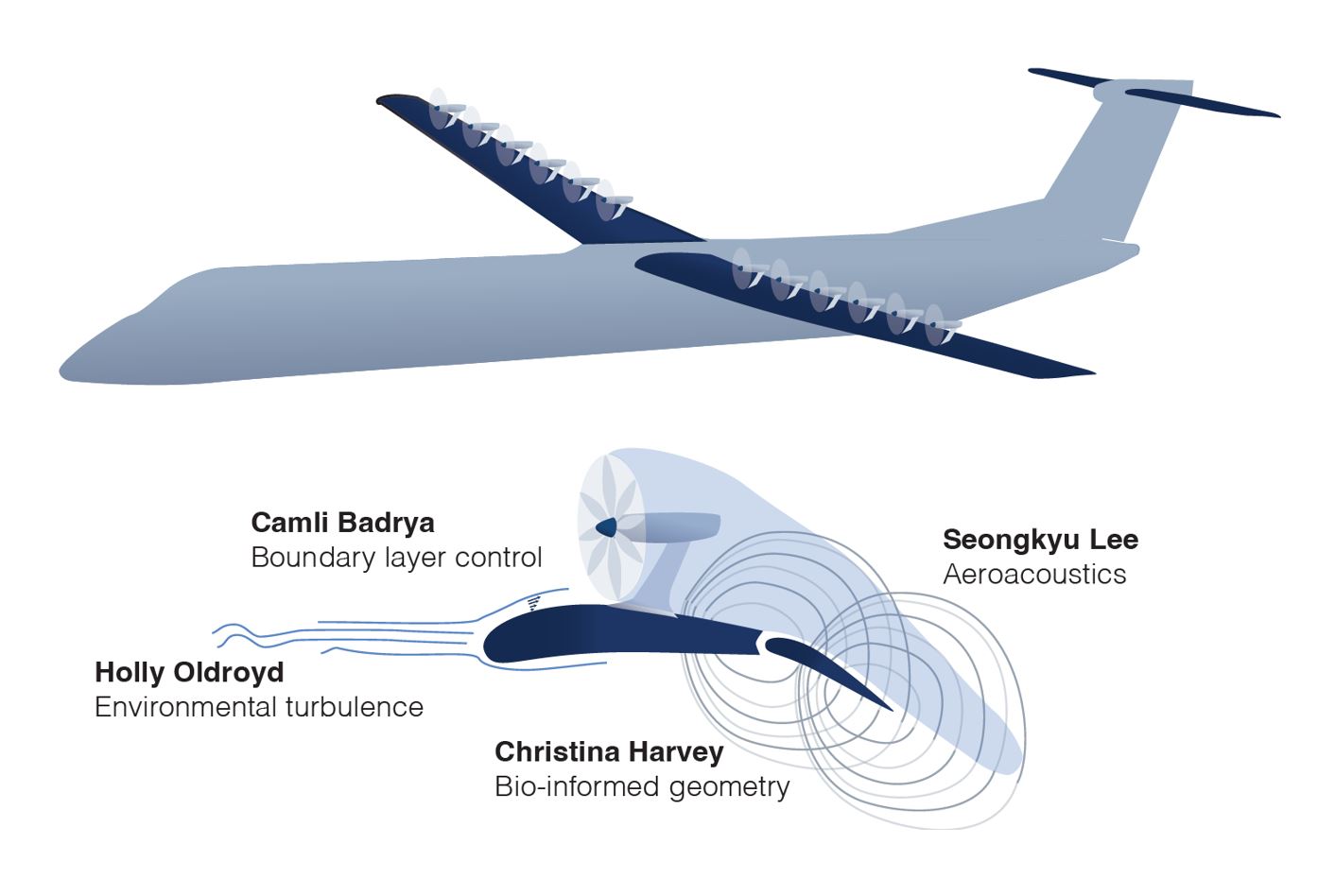
Living-learning Campus for Sustainable Transportation
PIs: Kari Watkins, Civil and Environmental Engineering; Junshan Zhang, Electrical and Computer Engineering; Iman Soltani, Mechanical and Aerospace Engineering
What if it was possible to transform mobility, while also advancing human health, strengthening climate resilience, and reducing the need for energy? This College of Engineering team believes it is. Individual transportation contributes to emissions, obesity risk, and injury risk through accidents, but more sustainable modes of transportation like cycling and transit can reduce these impacts. The team plans to use UC Davis and City of Davis as a model of sustainable transportation to attract students and researchers to study cyclist interactions and transit operations. By instrumenting intersections on campus, the team will be able to observe cyclist interactions to better understand design of infrastructure for safe cycling. By instrumenting the bus fleet, the team will be able to provide better information to riders and understand where the system becomes unreliable. And by sharing this data and the uniquely sustainable transportation system here in Davis, the team will be able to show the world how a sustainable multimodal transportation system can work.
Microfabricated Platforms for Building and Studying the Gut-Brain Axis
Lead PI: Erkin Şeker, Electrical and Computer Engineering
The gut-brain axis embodies bidirectional communication between the gastrointestinal tract and the central nervous system. The gut is colonized by a large and diverse population of microorganisms that communicate via small effector molecules. Dysbiosis of the gut microbiota is hypothesized to result in many disorders such as obesity and neuropsychiatric disorders. In addition, signals from the brain can influence the gut microbiota, creating an intriguing two-way communication. However, it is difficult to establish causation between mechanisms and their manifestations as higher-level dysfunctions due to many simultaneous physiological processes, creating a need for physiologically-relevant platforms to study the gut-brain axis. This Next Level Research Award will help address this challenge by employing engineering and biological tools to develop and utilize novel cell culture and microphysiological platforms to model the gut-brain axis. In addition, the projects will lead to new collaborations between faculty members interested in microbiome research.
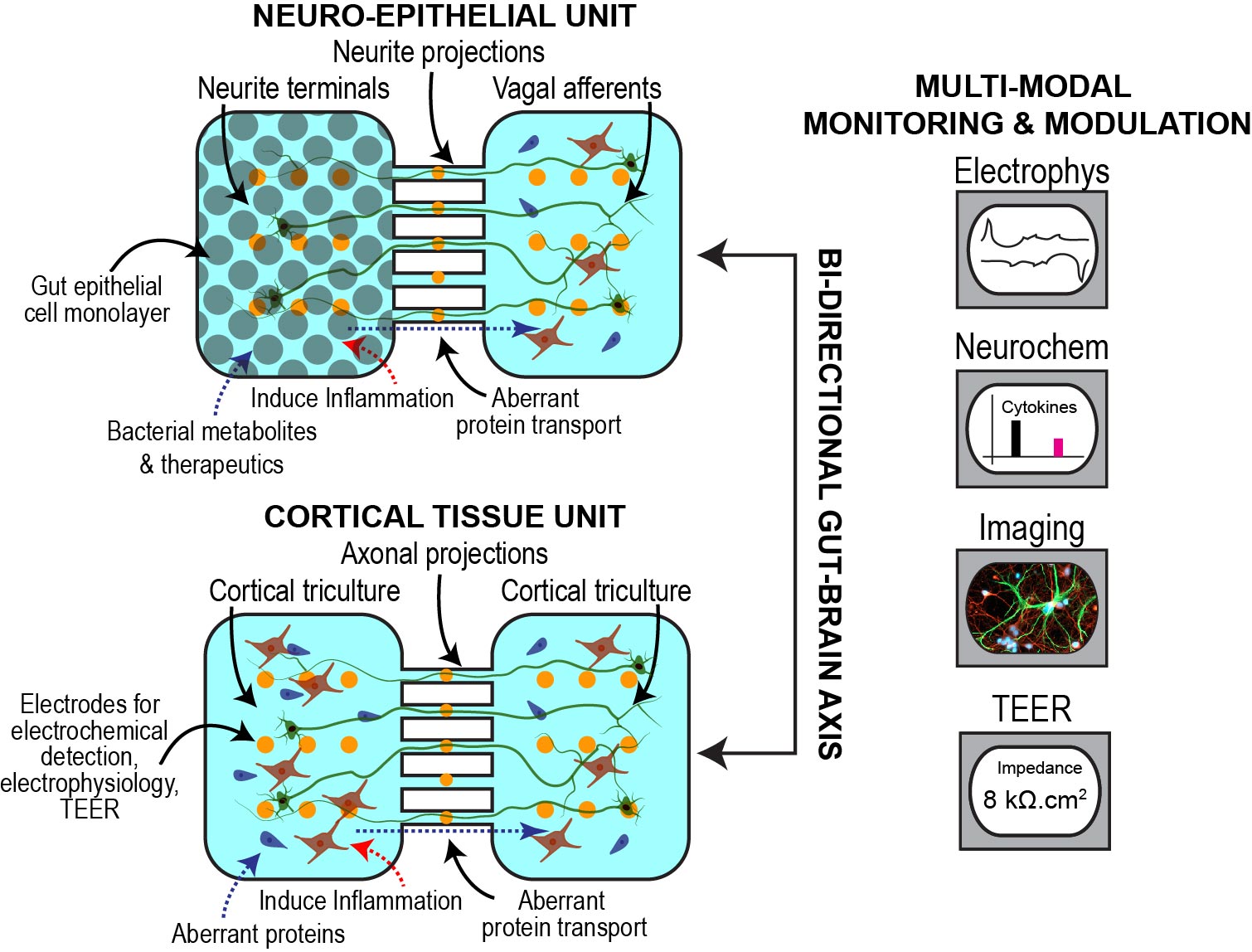
Quantum Information Science and Technology Initiative
PIs: Marina Radulaski, Electrical and Computer Engineering; Isaac Kim, Computer Science; Greg Kuperberg, Math and Computer Science
UC Davis has emerged as a national leader in Quantum Information Science and Technology, or QuIST, with Kuperberg making impactful research 20 years ago to ongoing National Science Foundation Partnerships from QuIST Faculty Fellow Isaac Kim and National Science Foundation CAREER and Air Force Office of Scientific Research Young Investigator Program awards winner Radulaski. The college boasts six new QuIST courses in Electrical and Computer Engineering and Computer Science as well as a student club, interdepartmental seminars, the NSF HIS Strategic Integration Summit and outreach efforts to students from kindergarten through high school. Funding from the last year’s Next Level award helped to create a QuIST faculty mailing list, website, and YouTube channel, new multi-campus grants, assist with student events like the Q-CaD Quantum Hackathon, Picnic Day Trophy, and Quantum Cryptography demo, and attract high profile visitors through a one-credit course called the QuIST Colloquium. The next 3 to 18 months will see the team focus on experimental and theoretical QuIST coursework and a QuIST seminar series. The team envisions a QuIST center, research, academic, and industry partnerships, and the creation of an equitable QuIST pipeline in the next five to seven years.
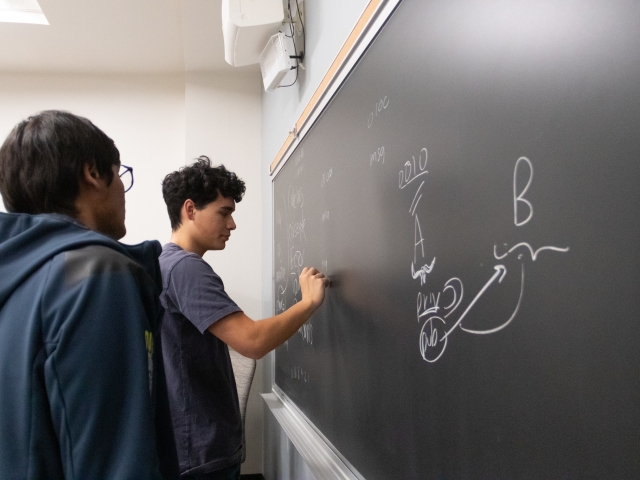
Students in the Quantum Computing at Davis Club interact during a November 2022 meeting. (Rishi Donapti/UC Davis)
Smart, Sustainable and Human-Centered Factories
PIs: Barbara Linke, Mechanical and Aerospace Engineering; Zhaodan Kong, Mechanical and Aerospace Engineering; Kwan-Liu Ma, Computer Science
Industrial activities account for about one-third of annual worldwide energy consumption. A human-centered and smart factory environment is needed to reduce this and achieve sustainable operations. The team will plan how to equip a lab with automated, robotic and manual operations with sensors and interfaces to develop solutions for sustainable decision-making. Early stages of the project will see the team collecting preliminary data for National Science Foundation Proposals, collaborating with external companies, and establishing internal collaborators at UC Davis. Ultimately, this project is aimed at making UC Davis a leader in inclusive sustainable industrial activities.
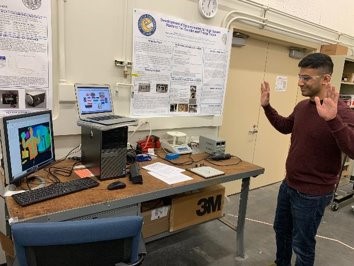
Projects with All Investigators and Centers
Merging Engineering, Biology, and Animation to Transform Morphing Aircraft Design [Transforming Mobility]
- Christina Harvey, Mechanical and Aerospace Engineering
- Jonathon Schofield, Mechanical and Aerospace Engineering
- Michael Neff, Computer Science
- Michele Hawkins, School of Veterinary Medicine
- Andy Engilis Jr., Wildlife, Fish, and Conservation Biology
- Juan Sebastian Nino Flores, The Mill
Breaking the 50% efficiency barrier with a thermophotovoltaic device [Revolutionizing Energy Systems]
- Jeremy Munday, Electrical and Computer Engineering
- Marina Leite, Materials Science and Engineering
- Scott McCormack, Materials Science and Engineering
- Potential external partners: Dr. Tarun Narayan and Dr. Brendan Kayes (Antora Energy)
Engineering Bionic Prostheses for All: Accessible Artificial Limbs and Improved Quality of Life [Advancing Human Health]
- Jonathon Schofield, Mechanical and Aerospace Engineering, Biomedical Engineering Graduate Group
- Wilsaan Joiner, Neurobiology, Physiology and Behavior; Neurology, Biomedical Engineering Graduate Group
- Dr. Clifford Pereira, Department of Surgery
- Dr. Andrew Li, Department of Surgery
- Laduan Smedley, PM&R
High-Performance, Zero-Emission, and Ultra-Quiet Aircraft Design and Operation with Over-the-Wing Distributed Propellers [Transforming Mobility]
- Seongkyu Lee, Mechanical and Aerospace
- Camli Badrya, Mechanical and Aerospace
- Christina Harvey, Mechanical and Aerospace
- Holly Oldroyd, Civil and Environmental
- John Hwang, UC San Diego
- Jacqueline Huynh, UC Irvine
- Nathan Alexander, Virginia Tech
- Trevor Wood, GE Research
Living-learning Campus for Sustainable Transportation [Transforming Mobility]
- Kari Watkins, Civil and Environmental Engineering
- Junshan Zhang, Electrical and Computer Engineering
- Iman Soltani, Mechanical and Aerospace Engineering
- Institute for Transportation Studies
- Campus Planning
- Unitrans
Microfabricated Platforms for Building and Studying the Gut-Brain Axis [Advancing Human Health]
- Erkin Şeker, Electrical & Computer Engineering
- Jiandi Wan, Chemical Engineering
- Maria Marco, Food Science & Technology
- Helen Raybould, Anatomy, Physiology & Cell Biology
- Allison Yorita, Lawrence Livermore National Lab
QuIST - Quantum Information Science and Technology initiative [Tools at the Nano- and Micro-Scales]
- Marina Radulaski, Electrical and Computer Engineering
- Isaac Kim, Computer Science
- Greg Kuperberg, Math/Computer Science
- External partners: LBNL, Berkeley QIC Center, U. Hasselt, IBM Quantum, IonQ, CISCO, 1QBit, Quantinuum
Smart, Sustainable and Human-Centered Factories [Intelligent Systems and Automation]
- Barbara Linke, Mechanical and Aerospace Engineering
- Zhaodan Kong, Mechanical and Aerospace Engineering
- Kwan-Liu Ma, Computer Science
- Potential external partner: Keysight Technologies

